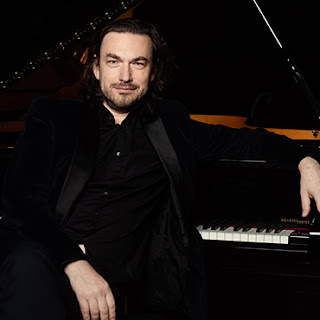 |
| Diana Damrau |
Schumann, Duparc, Granados, Turina, Obradors, Strauss; Diana Damrau, Maciej Pikulski; Wigmore Hall
Reviewed by Robert Hugill on 12 October 2021 Star rating: (★★★★)
A welcome recital from the German soprano, in an eclectic programme of German, French and Spanish song
Soprano Diana Damrau is a singer whom we have not heard more than we have (most recently in 2018, when illness forced her to drop out of Paris Opera's new production of Meyerbeer's Les Huguenots, see my review) and we last saw her in 2016 as Lucia in Covent Garden's new production of Donizetti's Lucia di Lammermoor, see my review), so it was a pleasure to be able to catch her Wigmore Hall recital on Tuesday, and clearly many others thought so. The hall was full and the response to her first entry on stage was nothing short of rapturous.
At Wigmore Hall on Tuesday 12 October 2021, soprano Diana Damrau and pianist Maciej Pikulski gave a recital which moved from Schumann's Frauenliebe und -leben, through songs by Duparc to a Spanish group with songs by Granados, Turina and Obradors, then finally a group of songs by Richard Strauss. It was quite an eclectic mix, providing a range of styles and contrasts through the evening rather than centring on a single emotional journey, though love was the prevailing theme throughout.
We began with Schumann's Frauenliebe und -leben, a very great cycle indeed though the idea of two male artists (Schumann and poet Chamiso) creating a work about woman's experience must now give us a moment's pause. Damrau and Pikulski didn't contextualise or explain, they simply presented us with the work in a performance where Damrau seemed to embody the female protagonist.
 |
| Maciej Pikulski |
The move from Schumann to Duparc is quite a leap, and we plunged straight in with the exotic languor of L'invitation au voyage. Languid and luxuriating in the music, Damrau sang in a highly characterful way. Unlike some singers in Duparc, it wasn't so much the 'luxe, calme et volupté' of the voice as what Damrau actually did with it that counted. Extase was intimate and full of character, we really believed it, whilst Le manoir de Rosemonde was strong and intense. Soupir was highly emoted and emotional, so much in such a small song, whilst Chanson triste was very much in the moment. Damrau and Pikulski's way with Duparc was not necessarily the usual one, approaching the songs more as character pieces, sketches of emotion, rather than moments of gorgeousness to be simply luxuriated in.
After the interval, we had an intriguing group of 20th century songs by Spanish composers in which each composer seemed to be investigating their song heritage. The sense of folk-lore was never far away, and it was never clear whether we were listening to an echo of the traditional music of Spain, or contemporary composers reimagining of it in the light of non-Spanish expectations.
Granados' 'No lloréis ojuelos' comes from his 7 Canciónes amatorias, a collection of love songs from 1914-15. This was simply lovely, Granados writes a restless, undulating vocal line which very much seemed to suit Damrau's voice. Turina's 'Tu pupila es azul' is the second of 3 Poemas from 1933, the text here written in imitation of Byron. The piece was full of drama and very folkloric inflections in vocal line and piano, plus a very sexy melisma at the end. Finally a trio of songs by Obradors, all coming from his four-volume Canciones clásicas españolas, described in Richard Stokes' programme note as songs that "refurbish melodies and poetic themes in what sounds like an authentic manner". Al Amor was full of seduction and drama, everything we might think of when the words 'Spanish song' come to mind, whilst 'Del cabello más sutil' was simpler and more romantic, though I found Damrau emoted a bit too much and would have liked less. This was certainly true of the curious 'Chiquitita la novia'. The words are so odd and presumably satirical, yet the song came over as strongly traditional whilst Damrau's over the top performance veered a little too close to mannered for my taste, though other audience members found it funny.
We finished with Richard Strauss, with seven of his most popular songs. Listening to Damrau's artistry here, I have to admit that I admired more than I was moved, she rather put me in mind of Elisabeth Schwarzkopf in the way she brought artistry to bear on each of the songs, creating a highly detailed picture which for some people can obscure the emotional core of the song. Einerlei was sung with a light touch, the highly decorative vocal line coming after a lovely, long piano introduction. Das Rosenband had a similar light touch, with a strongly intimate character, whilst Ständchen was rapture worn lightly. We got Freundliche Vision twice as she was not satisfied with her first performance as she had been convinced that she was going to sing another song. Touchingly intimate, the voice on a thread at times, there was also plenty of creamy tone. Wiegenlied featured a lightly traced vocal line floated over quite a strong piano, whilst Allerseelen was very personal with the voice not allowed to blossom until the very end, and Zueignung made a strong ending.
Except, of course, it was not the end. The audience response shaded from vociferous enthusiasm into positive rapture, and we were treated to Strauss' Morgen as a final song.
Never miss out on future posts by following us
The blog is free, but I'd be delighted if you were to show your appreciation by buying me a coffee.
Elsewhere on this blog
- To enter this music is to enter a different world, one that you wonder why you never discovered it earlier: Martin Jones plays Elisabeth Lutyens' piano music on Resonus Classics - record review
- Spiorachas – A High Place: Charlie Grey & Joseph Peach - record review
- Intense and redemptive: Janacek's Jenufa in the new production at Covent Garden - opera review
- If we continue to ignore these composers and their music then we are doing Hitler's work for him: I chat to Simon Wynberg about ARC Ensemble's Music in Exile series on Chandos - interview
- Musick's Monument: Lucy Crowe and Fretwork in consort songs by Byrd, Gibbons and Purcell - concert review
- Con arte e maestria: Virtuoso violin ornamentation from the dawn of the Italian Baroque - record review
- A fine way to celebrate a birthday: Robert King and the Kings Consort return to Purcell's odes with three for Queen Mary's birthday - record review
- Bravely engaging: the Solem Quartet's intriguing new recording of Thomas Adès' The Four Quarters - record review
- Magic & emotional turmoil: English Touring Opera in Handel's Amadigi di Gaula - opera review
- 'The more light-heartedly you can handle this, the better it would be' - Strauss, Hofmannsthal and Die ägyptische Helena - feature
- A day at the Hatfield House Chamber Music Festival, which is celebrating its 10th anniversary - concert review
- From 17th century masque to TV reality show: Blackheath Halls Opera's imaginative take on John Blow's Venus and Adonis - opera review
- Home



.jpg)






%20Craig%20Fuller.jpg)
No comments:
Post a Comment